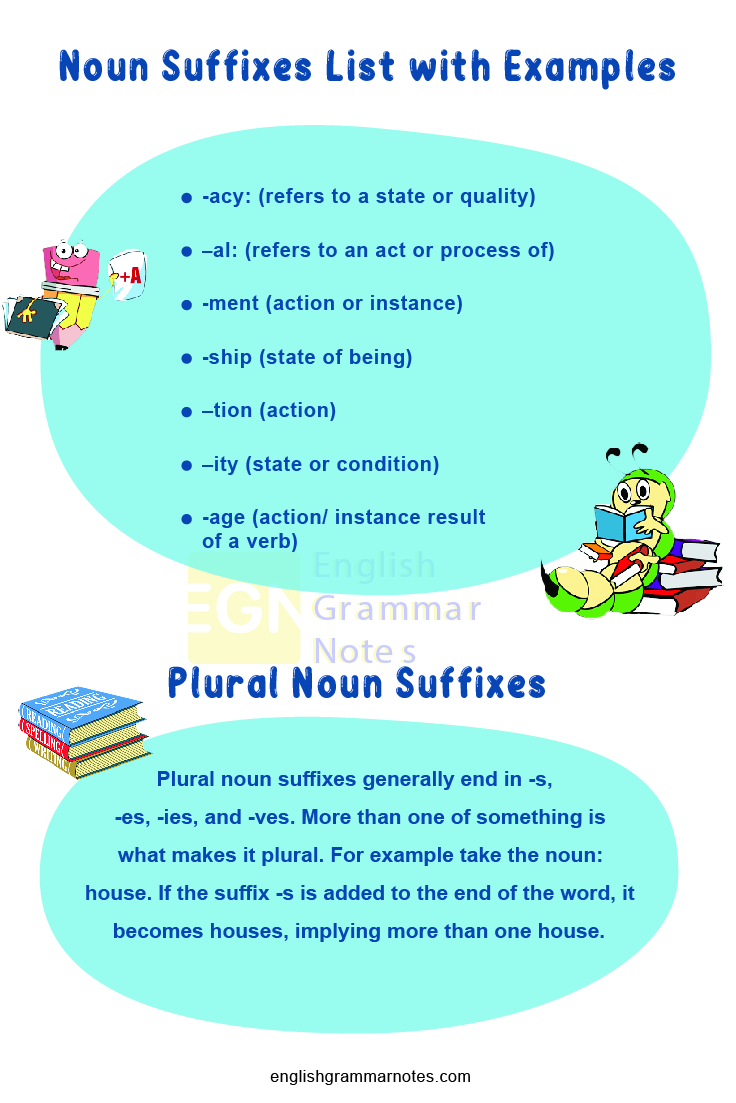Categorizing suffixes by their grammatical function helps you to grasp them easily. Noun Suffixes and Adjective suffixes are two such categories of suffixes, both of which have the ability to transform the grammatical function of a word. Today let’s have a look at what Noun suffixes are!
A noun is a part of speech that refers to a person, place, animal, or thing. Noun suffixes can be used to change the part of speech or to make a singular noun plural. To put it differently, a series of letters placed at the end of a root word and converting verbs and adjectives into nouns or singular to plural is known as a noun suffix. These suffixes give new meanings to the root word. Along with that they also create new words.
One of the easiest ways to create a noun from a verb is to add the -er ending to the root word. For example, adding –er to the verb protest gives the noun protester. Most words that end with the suffix ‘er’ will be nouns. This knowledge can help you to discover nouns more quickly in sentences.
- Noun Suffixes List with Examples
- Plural Noun Suffixes
- Suffixes Added to Verbs
- Suffixes Added to Adjectives
- Which are some of the common noun suffixes?
- What is the function of a noun suffix?
- Which are the three kinds of noun Suffixes?
Noun Suffixes List with Examples
There are several noun suffixes to learn. Having an idea of the typical noun suffixes will help you to easily identify more nouns. Given below is a list of noun suffixes.
-acy: (refers to a state or quality)
- privacy
- accuracy
- conspiracy
–al: (refers to an act or process of)
- refusal
- burial
- arrival
-ment (action or instance)
- punishment
- employment
- wonderment
- development
-ship (state of being)
- friendship
- kinship
- citizenship
- internship
–tion (action)
- demonstration
- menstruation
- registration
- alteration
–ity (state or condition)
- stupidity
- activity
- nativity
- reality
-age (action/ instance result of a verb)
- damage
- breakage
- wastage
- message
-ery (behavioral condition or location)
- bravery
- scenery
- gallery
- nursery
-th (a state or quality)
- depth
- strength
- warmth
–er (refers to a person or something participating in an action)
- protester
- runner
- publisher
- driver
- -ness (state or condition)
- kindness
- gentleness
- mindfulness
- tenderness
-ism (practice or state)
- multiculturalism
- conservatism
- idealism
- tourism
Do Read:
Plural Noun Suffixes
Plural noun suffixes generally end in -s, -es, -ies, and -ves. More than one of something is what makes it plural. For example take the noun: house. If the suffix -s is added to the end of the word, it becomes houses, implying more than one house.

Suffixes Added to Verbs
The addition of a noun suffix to the verb changes it to a noun. Given below are some of the noun suffixes used to convert a verb into a noun:
- -ery: Changes the verb to a place where the action is taking place or to the result of the action. When the verb ends in -er, then a -y suffix is added. Example: We can add the letter -y to the verb recover creating the word recovery. Recovery is a noun, whereas recover is a verb.
- tion and -sion: Describes the action taking place by changing the verb into a noun. Example: We can add the suffix -tion to the verb explore by dropping the -e creating the word exploration. Exploration is a noun, whereas explore is a verb.
- -r: Describes a person doing the action, or an object being used. Example: We can add the suffix -r to the verb sing creating the word singer. Singer is a noun, whereas sing is a verb.
- -ence and -ance: These suffixes describe the outcome of the verb. Example: Adding the suffix -ance to the verb important creates the word importance. Importance is a noun, whereas important is a verb.
Suffixes Added to Adjectives
Given below are three of the noun suffixes that change an adjective into a noun.
1. -cy:
Example: The word resident is a noun and we add the adjective suffix -cy to create the word residency. The word residency describes the condition of being a resident.
2. -ness
Example: The word lonely is an adjective. On adding the suffix -ness you get the noun loneliness. The word loneliness describes the state of being lone
3. -ity
Example: The word active is an adjective. Adding the suffix -ity changes it into a noun. The word activity is a noun that describes the condition of staying active.
FAQs on Noun Suffixes
1. Which are some of the common noun suffixes?
Noun suffixes can be used to change the part of speech or to make a singular noun plural. Some of the common noun suffixes include: -ment, -ity, -cy, etc.
2. What is the function of a noun suffix?
Noun suffixes can be used to change the part of speech or to make a singular noun plural. To put it differently, a series of letters placed at the end of a root word and converting verbs and adjectives into nouns or singular to plural is known as a noun suffix. These suffixes give new meanings to the root word. Along with that they also create new words.
3. Which are the three kinds of noun Suffixes?
Noun suffixes can be used to change the part of speech or to make a singular noun plural. Some of the common noun suffixes include: -ment, -ity, -cy, etc. There are three kinds of noun suffixes: those which convert singular to plural, those which convert a verb to noun, and those that convert an adjective to noun.
Conclusion
An idea of what noun suffixes are will help you convert everyday adjectives and verbs into nouns. Learning these word-endings can help you distinguish between a noun, adjective, verb, or adverb. So make sure to familiarise yourself with the common noun suffixes.
